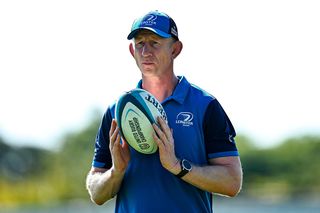New LGFA rules allow transgender girls to play Gaelic football – but not everyone is happy
Players over 16 must provide medical records showing their testosterone levels
The policy for trans women to play in LGFA games has been agreed. Photo: Getty.
The Ladies Gaelic Football Association has introduced a new policy that allows transgender women and children to play the sport.
Transgender girls aged between 12 and 15 will be able to play if they are approved by a new Transgender Application Committee.
Child players must submit confirmation from a suitably qualified medical practitioner that they have or are transitioning from male to female and intend to “live their life as a female”.
Under polices agreed at the LFGA congress last week, players aged 16 and over must also submit a confirmation from a medical practitioner or a Gender Recognition Certificate.
They must also provide medical records showing their testosterone levels in the previous 12 months were less or equal to 10 nanomoles per litre (nmlol/L).
The LGFA announced its review of its policy last August after a referee and a Na Fianna coach raised concerns about Giulia Valentino, a transgender woman, playing for Na Gaeil Aeracha, the GAA’s first LGBTQ+ team, in a junior shield final.
The referee, a man, stopped the game after the first break in play to tell Na Gaeil Aeracha there was “a problem with your number 21” and told them “the player is a man”.
A number of social media users had falsely claimed Valentino scored 2-09 in the game when, in fact, she was scoreless. In a later interview with The Guardian, Valentino said: “I will never be remembered for my sporting results but I’d like to be remembered for leaving a legacy of inclusion for other trans players.”
The LGFA said its new policy followed “a lengthy and detailed consultation process, which took into consideration worldwide international practice and legal advice”. It declined to say what consultation it undertook.
LGFA coaches, players, referees and officials have expressed concerns about the policy to the Sunday Independent and said they were unaware of any consultation.
It has similarities to the former policy of the Irish Rugby Football Union (IRFU) which set a testosterone threshold of 10 nmol/L for trans players. The IRFU scrapped it last year and effectively banned transgender women from women’s matches after reviewing medical and scientific evidence and guidance from World Rugby.
Peer-reviewed research had shown the physical differences between biological males and females showed advantages in strength, stamina and physique brought about by male puberty “are significant and retained even after testosterone suppression”.
Danielle Loughrey, a 39-year-old player with Buncranna GAA who is also the PRO for the Donegal County Board, said she is considering quitting the game.
“There was no consultation and they don’t seem to have taken into consideration the safety concerns of the female players,” said Loughrey. “This is a women’s sport.
"The testosterone levels stick out a mile. It’s a massive allowance. Studies out there show transwomen, even with hormone suppression over three or four years, their baseline strength is still greater than what a female starts with.
"To me this is dangerous. Clubs and county boards are encouraging teams not to use younger girls in women’s matches because it’s dangerous but now they want transgender women to take part?
"How are we supposed to encourage young girls to play when there could be a man in the opposite team?”
Loughrey said she has been playing Gaelic football since primary school but did not think she could encourage girls to play given the new policy. Her team-mates have discussed agreeing to “walk off” any game where the opposition has a transgender player because of the “unnecessary risk” of injury.
Máirtin Flannery, a LGFA referee in Mayo, said his responsibility was to ensure player safety and he believed “some women could be seriously injured” due to the new policy.
It has also been criticised by BelongTo, which receives government funding to promote LGBTQ+ inclusion in sport.
The policy “presents significant barriers for the inclusion of trans women and girls over the age of 12 in ladies' football”, it said. It wants the LGFA to “urgently review this policy”.
“This policy directly affects a small number of trans players in Ireland, but will have deep-reaching negative consequences across society,” it said.
“Trans young people have been participating in Gaelic games at a grassroots, community level. These young players have been actively included by their teams, their communities and their coaches.
"However, this policy sends a message to trans women and girls, their families and allies that they are not welcome in ladies' football. The policy does not align with LGFA's values which include pride, inclusiveness, integrity and respect and we urge them to reconsider this policy.”
The policy requires all trans players to submit an application to the LGFA’s Transgender Application Committee which can exclude a player if the association is made aware of “an unacceptable risk” that may arise from a transwoman’s participation.
If that happens a five-member panel of a Transgender Risk Committee reviews the decision.
"It is expected that unacceptable risks will likely only arise in the most exceptional circumstances and will not arise solely from the mere participation of a transwoman’s participation,” it says.
Join the Irish Independent WhatsApp channel
Stay up to date with all the latest news














